News & Events in Belarus
High-profile appointments, offer to China, Union State example in President's Week
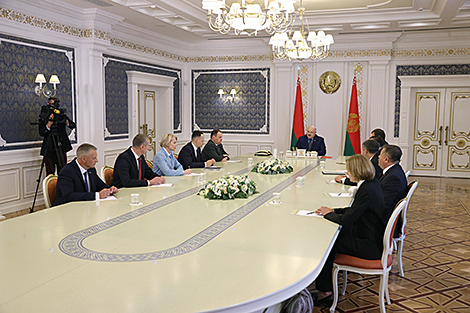
The work schedule of the Belarus president is always full of events. Aleksandr Lukashenko holds conferences and working meetings on the most topical matters concerning the country’s development, regularly visits the regions, goes on foreign trips and welcomes foreign guests, talks to reporters, signs decrees and laws. And even if there are no public events, it does not mean that the head of state does not work. It must be said that even when he relaxes, for instance, by playing ice hockey or chopping firewood, Aleksandr Lukashenko happens to find the time to give yet another instruction. All the decisions must be prompted by life, he likes to say.
The President’s Week project is intended for those, who want to keep up with the head of state, be up-to-date on the latest statements and decisions of the Belarusian leader.
The head of state started his work week by meeting with Governor of Russia’s Leningrad Oblast Alexander Drozdenko. There are many promising projects starting with agribusiness and ending with gas infrastructure development. The global goal is to double the current trade turnover, which is slightly below $1 billion.
The head of state held negotiations with Russian Minister of Foreign Affairs Sergey Lavrov. Aleksandr Lukashenko mentioned not only the coordinated foreign policy of the two countries but also thanked Russia for support with Belarus’ accession to the Shanghai Cooperation Organization. Sergey Lavrov assured that it is virtually a settled matter.
The president had an important meeting with rectors of leading Chinese universities, who came to Belarus in such large numbers for the first time. Aleksandr Lukashenko suggested taking education cooperation and scientific cooperation to new heights.
The second half of the work week began with a conference on the operation of the banking sector.
But personnel management decisions overshadowed the entire news agenda on Thursday. Aleksandr Lukashenko literally put to shame all the experts, who had been contemplating for months who will head the Belarus President Administration. The president made nearly ten high-profile appointments and explained reasons behind his decisions.
Outstanding graduates and professors of higher education institutions were awarded in the Palace of Independence on Friday. Aleksandr Lukashenko addressed the young people with a valedictory speech. By the way, on Sunday, 30 June Belarus marked Youth and Students’ Day. The head of state offered his greetings on that occasion as well.
This year’s Forum of Regions of Belarus and Russia took place in Vitebsk Oblast. Aleksandr Lukashenko sent a video address to the forum’s participants. He emphasized that innovations should become the key motive force of the economies of the two countries.
Over the past week the president also appointed a number of army officers, approved new military uniforms, and promoted a number of officers of defense, security, and law enforcement agencies to general ranks.
Aleksandr Lukashenko congratulated the prosecution service on the professional holiday and a special rapid response unit of the interior troops of the Internal Affairs Ministry on the 25th anniversary.
Two significant jubilees in the regions were not left without the president’s attention either: Vitebsk turned 1,050 and residents of Staryye Dorogi celebrated the 500th anniversary of the city’s foundation.
Another congratulation was sent to Moscow. Gennady Zyuganov, the leader of the Communist Party of the Russian Federation faction in the Russian parliament, turned 80. He is a genuine friend of Belarus and a staunch supporter of integration processes.
TWO BILLION MILESTONE. How do Belarus and Leningrad Oblast intend to expand cooperation?
On 24 June Belarus President Aleksandr Lukashenko met with Governor of Russia’s Leningrad Oblast Alexander Drozdenko and sketched out prospects of cooperation with the Russian region.
Two years ago the parties discussed the need to increase mutual trade to $1 billion. According to specialists, the trade is expected to reach this milestone in 2024.
“I think we need to aim for $2 billion. We must establish flows. We will find these options. Moreover, there will be a serious opportunity to increase trade. We have always had problems with cargo transportation. We have finally begun restoring railways, which were capable of handling 1.5-2 times more cargo in Soviet times. This year we will restore the railways and there will be no problems with cargo transportation in the northern direction. Moreover, we have begun the construction of our own ports in your region and in Murmansk. We can’t get there without you. Therefore, I think we can exceed the $2 billion milestone definitely in the next five-year period. Our main goal is to move forward together, building up industrial and scientific potential, and most importantly, to strengthen technological sovereignty,” the president stressed.
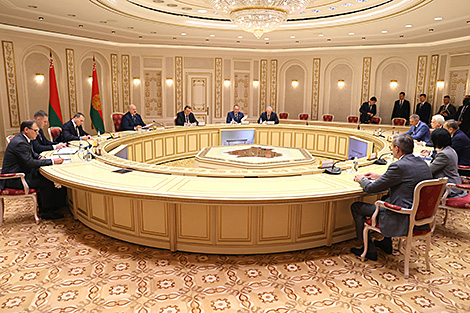
In his words, the northern direction is the key one for Belarus: “We have big plans in this direction and will definitely implement them. I think with your help and support.”
“On the other hand, we have always maintained a vibrant dialogue with Leningrad Oblast. There are many new interesting projects and ideas. We branched out into many promising avenues of cooperation in just a year,” the head of state said. “We implement everything we agree on no matter how difficult it might be for us. This is the most important thing we strive for.”
Prospects of cooperation in a number of cooperation avenues were discussed during the meeting. Those included gas infrastructure development, civil engineering, shipments of various machines, equipment, and vehicles, agribusiness, tourism, and health resort treatment.
Gas infrastructure development
Leningrad Oblast intends to build new boiler houses running on natural gas. Aleksandr Lukashenko noted that Belarus is ready to join this large project.
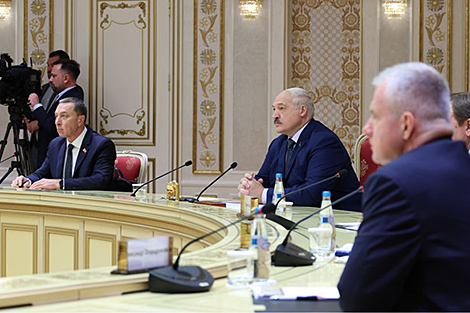
“We can supply the relevant equipment and build boiler houses, lay main gas pipelines, connect them to households,” he said.
After the meeting the Leningrad Oblast governor told reporters that Belarus’ offers fully satisfy the Russian region: “We have already studied the track record and price parameters. We are completely satisfied with Belarus’ proposals. It is clear that we will have to go through tenders and certain procedures. But everything is very competitive and very high-quality.”
Investment projects and the development of infrastructure
“As I have been informed, as you work to establish centralized control, you are reforming the system of road construction and maintenance enterprises. We are at your disposal starting with machines, vehicles, and equipment and ending with the experience we’ve accumulated,” the president suggested.
Belarusian companies are also interested in taking part in large investment projects in Leningrad Oblast. This applies primarily to construction services and the supply of building materials.
“Another example of our successful cooperation is the Vysotsky grain terminal in Vyborg District. The project is unique. You have completed the first phase. I have been briefed that it is supposed to reach full capacity by the end of the year,” Aleksandr Lukashenko said.
Negotiations have been recently held with the company Northern Construction Department, which acts as the general contractor for the construction of units No.3 and 4 of Leningrad nuclear power plant No.2. Belarusian specialists have already started working on the matter of supplying a wide range of building materials and other products, the president said.
“I know that there is a demand for unique building competencies. We have prepared them with assistance of the Russian Federation. We will also work on this matter,” the head of state promised.
On the whole, at present Leningrad Oblast lacks about 50,000 civil engineering workers, including about 10,000-12,000 qualified ones. “We understand that it is very difficult to satisfy this demand. But we can at least look into options for getting major Belarusian companies as subcontractors and hiring single-discipline specialists. Those are assemblers, welders, adjusters of complex digital equipment and so on. We count on aid and support in this regard,” Alexander Drozdenko said.
Shipments of machines, vehicles, equipment
Aleksandr Lukashenko also recalled Belarus’ capabilities to supply various types of mechanical engineering products.
“In the manufacturing sector we will be able to replace competencies of the Western partners that have left the market. We will be pleased to work with Leningrad Oblast. These are our kindred people. They are just like Belarusians. Therefore, you can count on us,” the president noted.
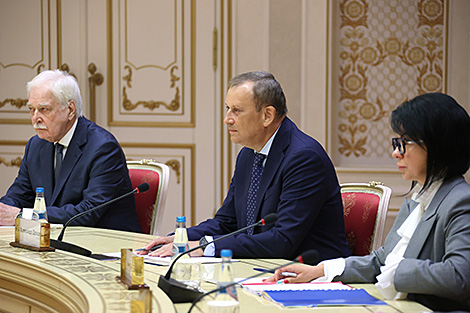
In turn, Alexander Drozdenko said that every meeting with the Belarusian leader gives a new impetus and new plans for development. “Everything we talk about at these meetings is put into practice. Consistently, step by step,” the governor emphasized.
It was noted that the parties had already intended to increase trade to the equivalent of $1 billion in 2023.
“We fell short of the target just a little. The trade was almost $935 million. But in January-May trade rose by more than 23%. It means that we will reach the milestone. We see the pace picking up. This is absolutely logical as we continuously expand avenues of cooperation,” Alexander Drozdenko said.
For example, just like Belarus Leningrad Oblast has a strong agricultural sector and, accordingly, it needs machines and vehicles.
“By the way, we are one of the first regions to begin subsidizing purchases of Belarusian equipment from our own budget. We subsidize 35% of the cost of tractors and 40% of grain harvester costs. If we talk about outdoor vegetable farming and potatoes, we subsidize 50% of the costs. The conditions are absolutely the same for Russian suppliers and for Belarusian ones,” the governor said.
He also noted changes in the equipment purchase structure. Last year Belarusian equipment accounted for 21% of the total purchases. In January-May this share rose to 33%. “In other words, the conditions are normal and stable,” the head of the region concluded.
AN EXAMPLE FOR GOOD COUNTRIES. How Belarus and Russia defend common interests in the international arena
On 25 June the president held negotiations with Russian Minister of Foreign Affairs Sergey Lavrov, who was in Belarus on an official visit. Sergey Lavrov had had negotiations at the Belarusian Ministry of Foreign Affairs the day before. A statement on foreign policy tasks of the Union State integration was signed as a result.
“First of all, I would like to praise our foreign ministries for the good work. I always say that our foreign ministries are an example of work for other agencies on the Union State track. I am grateful primarily to you for this,” the Belarusian head of state noted at the beginning of the meeting.
In turn, Sergey Lavrov emphasized that the foreign ministries are putting in their best efforts into fulfilling the strategic foreign policy tasks set by the presidents of Belarus and Russia: “Our foreign policy activities are structured in such a way as to provide diplomatic support for integration processes. As we strengthen coordination, we always have to bear in mind not only interests of Belarus and Russia but also interests of the Union State of Belarus and Russia.”
“Today we use our relations to show good countries and good peoples how relations between states should be built. Much of the credit for this goes to you and the Belarusian Ministry of Foreign Affairs. We will continue cooperating in this direction,” the Belarusian leader said.
He also thanked the Russian side for the decision to send a large-scale military delegation and a group of senior officials to the Independence Day parade in Minsk that will mark the 80th anniversary of Belarus’ liberation from Nazi invaders.
A coordinated stance on foreign policy
Aleksandr Lukashenko mentioned the coordinated stance of Belarus and Russia on foreign policy: “We have absolutely no problems when it comes to interaction between our foreign ministries, or our foreign policy or our work on international platforms from the United Nations Organization to this miserable OSCE. We have absolutely the same agenda. We speak up on the key issues from the same point of views. And Russia can always count on Belarus’ support on the matters we can provide support for. I thank you for always providing the relevant support to us,” the president said.
Sergey Lavrov noted that they had discussed the United Nations Organization and the OSCE in detail during the talks at the Belarusian Ministry of Foreign Affairs the day before. “You were lucky because you were not part of the Council of Europe. Therefore, you didn’t have to leave,” he noted.
Belarus’ Shanghai Cooperation Organization membership
Aleksandr Lukashenko thanked Sergey Lavrov and the Russian leadership as a whole for assistance with Belarus’ accession to the Shanghai Cooperation Organization as a full member. Belarus’ full membership is expected to be formalized during the Astana summit in early July.
“We strongly hope that this [Belarus’ accession] will happen in Astana. At least, judging by your recent statements, I see that we have fulfilled all our obligations and there are no problems with Belarus’ accession to the Shanghai Cooperation Organization today. This is very important for Belarus,” the president said.
Aleksandr Lukashenko noted the importance of being present in such a “more or less specific” international organization that involves major powers. “It is important not only from the point of view of reputation and politics, but also from the point of view of economy. It offers an opportunity to discuss any issues, including specific ones, at any time,” the head of state said. “We will now participate in making all the decisions that the Shanghai Cooperation Organization is supposed to make due to its status.”
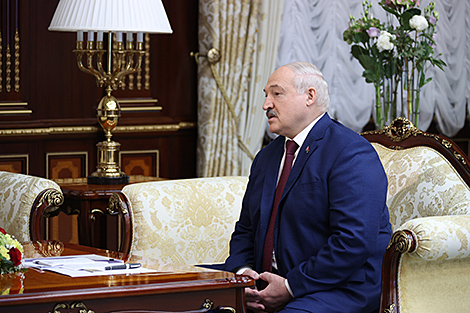
In turn, Sergey Lavrov assured that everything has been settled as far as Belarus’ full membership in the Shanghai Cooperation Organization is concerned. “All agreements have been stipulated. The very first act of the summit in Astana will be the official admission of Belarus as a full SCO member. Belarus will participate in the rest of the summit on an equal footing with all the other members,” he said.
Promotion of a Eurasian security concept
During negotiations with the Belarusian head of state Sergey Lavrov mentioned the promising nature of promoting a Eurasian security concept, including by using the venue in Minsk. The relevant ideas had been previously voiced by the presidents of Belarus and Russia.
“This idea was developed further in Minsk last autumn as Belarus hosted the first conference on Eurasian security as the chair of the Collective Security Treaty Organization. After that it was decided that Minsk will host this conference regularly, on an annual basis, to promote discussion on this topic. We actively support this,” Sergey Lavrov said. “We have already received an invitation to the second conference in late October - early November. We will be happy to attend. And yesterday we talked about how we can promote the Eurasian security concept as a whole and involve like-minded people. I think that the prospects are very good.”
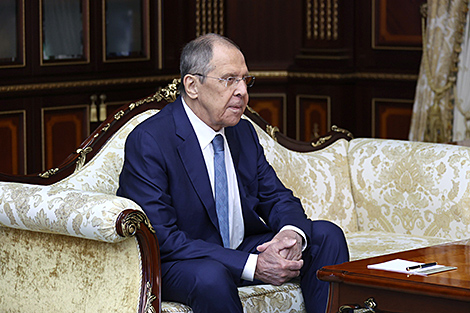
GLOBAL PLATFORM. What ambitious project does Lukashenko want to implement together with China?
On 25 June the president met with Party Secretary of Peking University Hao Ping and representatives of Chinese universities. Heads of 15 Chinese higher education institutions, Belarusian Education Minister Andrei Ivanets, and rectors of nine Belarusian higher education institutions, including regional ones, took part in the meeting. The large Chinese delegation was in Minsk to participate in a forum of rectors of higher education institutions of Belarus and China.
Aleksandr Lukashenko remarked that Belarus had never hosted such a big delegation of heads of China’s leading higher education institutions before. “It is a vivid example of the high level of relations between Belarus and China, an indicator of increasingly vibrant cooperation not only in economy, but also in science, education, culture and other areas,” the head of state noted.
Participants of the forum of rectors were supposed to discuss the expansion of academic exchange programs, communication between young people, the expansion of interaction between universities, the development of cooperation in the field of fundamental scientific research. Belarus is interested in further development of partnerships with China in all aspects of the education sphere. It is particularly topical today when the countries work together to implement cutting-edge projects in the field of biotechnology, chemical industry, processing industry, production of unmanned aerial vehicles, and electric vehicles.
The head of state recalled that he visited China when he was an MP and spoke about a great future of this country. Almost no one believed in it back then, but time has shown that Aleksandr Lukashenko was right.
“Since I became president, for three decades we have been persistently and consistently building our friendship. We maintain good relations with the leadership of the People’s Republic of China. You invest a lot in those areas where we do not have technologies. You create enterprises in our country, of which there are only 4-5 in the world. Like the Belarusian National Biotechnology Corporation. It is one of the leading enterprises. We constantly expand the operation of this company. China helps us a lot with defense and security. It is no secret. We work together on many matters,” the Belarusian leader said.
A global education and science platform in Belarus
The head of state suggested taking cooperation to new heights by promoting contacts not only between higher education institutions. He suggested thinking about setting up a global education and science platform in Belarus for the sake of spreading education, culture, and science onto the European continent. “We are ready to play a serious role in it. Indeed, we are moving forward step by step, implementing certain projects, but time plays a crucial role now. It is necessary to do everything quickly in order to be a leader, to achieve results,” he said.
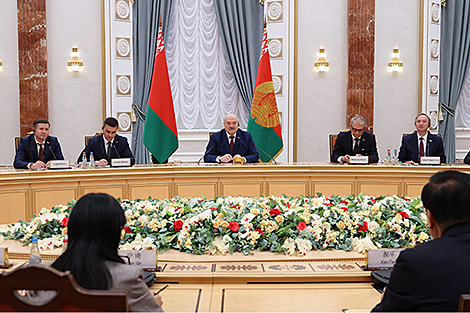
By the way, matters of cooperation in education and science were very seriously discussed during Aleksandr Lukashenko’s talks with China President Xi Jinping in December 2023. “Mr. Xi Jinping and I agreed that if China needs it, it can use Belarus to promote China’s interests in Europe,” the Belarusian leader noted. “China cannot exist without Europe. China is a giant country, it sets the tone in the world. Therefore, it needs to cooperate with the powerhouses of our planet - the USA, the European Union, Russia, India, some other countries. This is why we are ready to offer you all kinds of support in promoting your interests in the European Union. A lot has already been done on this front.”
The head of state backed the initiative of Belarusian and Chinese higher education institutions to set up a fundamental research center: “I am sure that its operation will become a new cycle of scientific and technological advance. Given that we have absolutely no closed topics from our friends in China, we are ready to share, among other things, those technologies that China does not possess today. You are our friends, our brothers. You can count on us.”
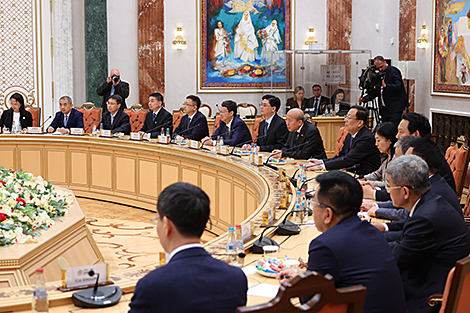
The president noted: “Today we need to accelerate this cooperation. This is the key to our scientific sovereignty and successful import substitution.”
He also thanked the Chinese side and Hao Ping for their attention and support of the realization of the joint educational program in biotechnology. “Our students are very satisfied with their training under this program. I would like to see more such programs. This area is extremely important for us, and the Belarusian side is interested in extending this program to the master’s level,” the president said.
The head of state also proposed to consider the possibility of holding a joint youth forum in 2025 within the framework of the Days of Friendship and Unity of Belarusian State University and Peking University. “We need to make such forums an annual event and invite students from partner universities,” he said.
Joint cultural and sport plans
The president said that a very serious program is being prepared, as part of which young Belarusians will go to China to represent not only the Belarusian culture but also the entire Slavic culture over there.
Speaking about sport, Aleksandr Lukashenko mentioned the intention to implement the project the sides agreed on during his visit to Beijing University in December 2023 as fast as possible.
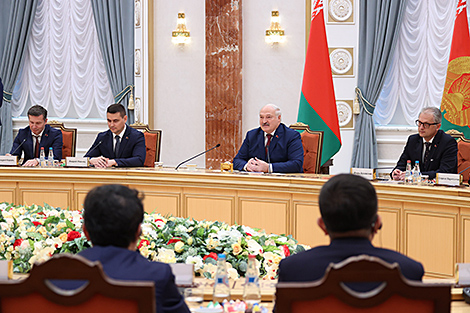
“We agreed to build a sport center at Peking University with the help of Belarus. I am convinced that I will find time to come to you again and present Belarusian sport, including ice hockey, at a higher level. We are willing to cooperate with you. We want the Chinese to play hockey at the level of world teams, although you have already begun playing hockey very seriously and you participate in the KHL. We play together with you in this league,” the president said.
“We would like to leave a more profound mark on the development of culture and sport in the People’s Republic of China,” Aleksandr Lukashenko added.
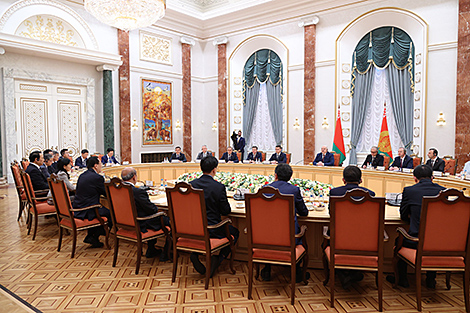
Addressing Hao Ping, the head of state noted: “We have many good humanitarian projects, including in sports and culture. We might start with Peking University and then we will invite your colleagues in attendance to join in. We will be glad if our input is of service in this huge, promising, rapidly developing state.”
TO EXPAND CAPABILITIES. Why did Lukashenko convene a conference to discuss banking sector’s performance?
On 27 June the president hosted a government conference to discuss the operation of the banking sector. A lot stayed off camera since money loves silence and former partners continue introducing more sanctions. But just like water money will always find a way.
The conference had been prompted by proposals of the National Bank of the Republic of Belarus regarding further development of individual banking structures taking into account prospects of cooperation with potential investors and external business partners. Aleksandr Lukashenko wanted to make sure that these approaches would help accomplish tasks of national importance. “The state is at the heart of everything,” he pointed out.
The president stressed that the implementation of the submitted proposals should enhance capabilities of the banking sector and facilitate the development of Belarusian enterprises. “There should be no red tape. I have already told you at the beginning: forget about the sanctions. You can find a way out of any situation,” the head of state is convinced.
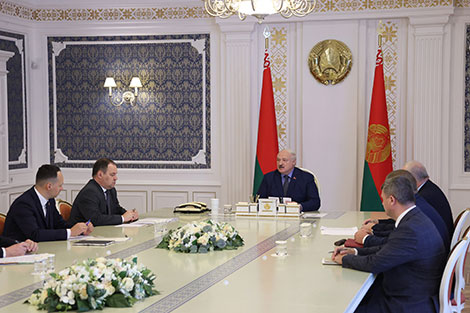
He asked participants of the conference to expand on the matter of organization of transboundary transactions. “We already discussed this topic at the end of March and we agreed to help domestic enterprises make payments to foreign partners and return foreign currency earnings to the country,” Aleksandr Lukashenko recalled.
PERSONNEL RENOVATION. What are reasons behind high-profile appointments?
The head of state regularly makes personnel management decisions but several key positions have been vacant for several months already. For instance, the position of the head of the Belarus President Administration or the deputy prime minister in charge of overseeing agriculture.
Appointments made on Thursday, 27 June were partially expected. But the scale of the personnel reshuffling and the persons Aleksandr Lukashenko entrusted various high-profile government jobs to were not. The head of state presented his reasons for making these appointments in public.
Aleksandr Lukashenko remarked that all the candidates are mainly young and promising people. At the same time their responsibilities will not be entirely new for them: they have already had to deal with these matters one way or another before now.
“A new generation. What I’ve been talking about. A generational change is in progress. Young, promising, and professional people should rise to power. Not only to manage individual areas. There are no non-professionals at this table,” the head of state stressed.
In his words, over the course of several years the new generation of administrators will have to implement everything the 7th Belarusian People’s Congress discussed in April.
“The country needs to receive a good government. Drive belts connecting the president and the government via the Belarus President Administration. We need results and efficiency. I warn everyone categorically: no foot dragging and red tape. If an issue needs to be addressed and you see it can be addressed within a day or two, then get it done. May god have mercy on you if starting Monday I will continue getting reports about this foot dragging and red tape as before. I warn the Belarus President Administration specifically: ministers should run about and get things done. If the government machine fails to do something, give it a hint and make demands in no uncertain terms,” Aleksandr Lukashenko identified the task. “Efficiency must be increased unbelievably if we want to survive this crazy fight. Every one of you knows what is going on around us.”
Dmitry Krutoi changed the job of the ambassador to Russia for the position of the head of the Belarus President Administration. However, he will oversee Belarusian-Russian cooperation at least initially and will help the new ambassador.
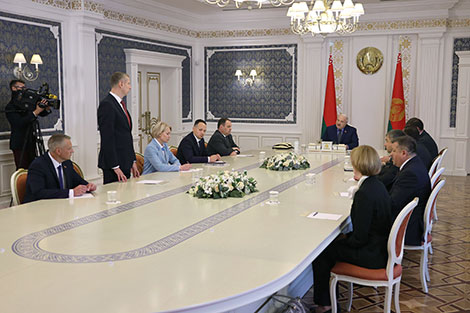
“You will be responsible for it for now. If you feel we don’t need this oversight, tell me. Across the board. Including your visits to Russian regions just the way you did it when you were the ambassador. There are no topics to avoid,” the president said.
But the job of the head of the Belarus President Administration should be prioritized. Aleksandr Lukashenko counts on Dmitry Krutoi’s personal qualities, who had earned a reputation of a very active man and even a workaholic. He is very exacting towards his subordinates.
“They shouldn’t stay calm. If they fail to do some work in time, they should work on a weekend. This is what is expected of the President Administration today, first of all in terms of my control over the government and other structures. They should work three times more today than yesterday,” the Belarusian leader added.
Natalya Petkevich was appointed First Deputy Head of the Belarus President Administration. She is an experienced person. She worked as part of the Belarus President Administration for many years, including in the same position.
Aleksandr Lukashenko said: “There will be no applause [on the part of subordinates] considering your insistence on high standards and your principled approach. Your knowledge. You know everything.”
Aleksandr Rogozhnik was appointed new ambassador to Russia. He has been working as the industry minister up till now. He was chosen because a majority of Belarusian-Russian projects are connected to the manufacturing sector.
“We still have too many issues over there. Let him take of that,” the Belarusian leader said.
Aleksandr Yefimov will run the Industry Ministry. He has been working as a deputy industry minister up till now. The tasks given by the president include work on deepening and enhancing industrial manufacturing because Belarus truly makes a broad range of machines, vehicles, and equipment but some of their key components are not always of domestic make.
“Do we make engines for all our vehicles? No. We don’t make gearboxes at all except for tractors and so on. These are our perspectives. It is one of the avenues,” Aleksandr Lukashenko gave an example. “Later on people started liking BelGee cars. Those are good cars. I’ve already said that making cars was the president’s dream. We now make cars. It is now necessary to expand and develop this industry. We have to at least make car bodies instead of importing them from somewhere. Car manufacturing is limited mostly to assembly for now. We have to make our own cars through massive deep manufacturing localization.”
Maksim Ryzhenkov was appointed Minister of Foreign Affairs. He has worked in various positions in the Belarus President Administration for a long time. He has been essentially the acting head of the administration as of late after the former head of the presidential administration Igor Sergeyenko was elected to the parliament in February.
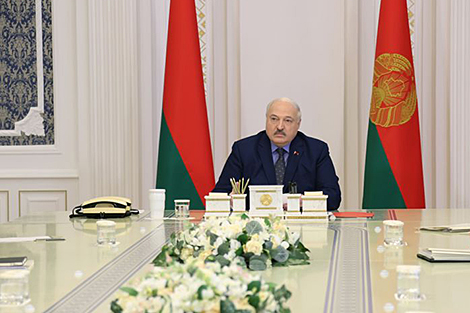
The new minister has an impressive background of working as part of the Ministry of Foreign Affairs system, but Aleksandr Lukashenko was attracted to making this personnel decision by other things.
“You are a tough, demanding person. The Ministry of Foreign Affairs needs to be brought to its senses. I want to say it point-blank: the Ministry of Foreign Affairs needs to be shaken up so that it gets its act together,” the head of state said. “I know that the situation over there is complicated. Give everyone [a chance], but those who do not want to work and those who will not hear me today, should not work there.”
The former minister of foreign affairs Sergei Aleinik was appointed a member of the Council of the Republic. But he will continue overseeing foreign affairs. Aleksandr Lukashenko stressed that appropriate members of the parliament will oversee the work of the Ministry of Foreign Affairs and some aspects of operation of the government.
“Parliamentary oversight over the work of the Ministry of Foreign Affairs and over some aspects of the work of the government will be stepped up,” the president stated. “All of you asked for more powers. You will get them, including the parliament.”
Chairman of the Brest Oblast Executive Committee Yuri Shuleiko was appointed deputy prime minister in charge of overseeing agriculture.
Aleksandr Lukashenko said: “Yuri, look at what functions you will undertake in addition to agriculture. Why? I need a sensible and skilled processing industry specialist. We keep talking about agriculture all the time as if it was limited to crop farming and animal husbandry. But no. It also includes processing and sales of products. This iron work is yours, Yuri Vitoldovich [Shuleiko]. You are in charge of overseeing the fulfillment of programs chosen by the president. You know them well.”
At the same time Aleksandr Lukashenko pointed out that Yuri Shuleiko will keep watching over Brest Oblast until a new governor is appointed. These matters will also remain part of his job description as a president’s authorized representative.
First Deputy Chairman of the Vitebsk Oblast Executive Committee Anatoly Linevich will lead the Agriculture and Food Ministry. The head of state explained the decision by saying the following: “Why did I choose you among a bunch of candidates for the ministerial job? The fact that you’ve worked as an executive in agriculture and you were quite good at it, that you’ve worked in decent agricultural enterprises was the decisive one. It is a great advantage of yours.”

Just like Yuri Shuleiko Anatoly Linevich will continue overseeing the state of affairs in his region.
“I would very much want you to succeed. I will help you by all means. You know the tasks that the country has to accomplish in the field of agriculture,” Aleksandr Lukashenko added. “Keep in mind that you don’t harvest crops and don’t sow them. Your job is primarily new technologies. Keep bringing new technologies into the country. While oblast governors should take care of sowing and harvesting. This is why bring new technologies and oversee the observance of these technologies. You know the bottlenecks.”
By the way, speaking about the former Agriculture and Food Minister Sergei Bartosh, the head state gave instructions to submit proposals on his future employment. The former minister will be assigned to a new job.
The president also stressed that it is necessary to use the knowledge and experience of the senators Mikhail Rusy in work in Brest Oblast and Leonid Zayats in work in agriculture. The latter will continue overseeing land amelioration as a former deputy prime minister in charge of these matters. Both senators will contribute to the work of the new deputy prime minister and the new agriculture and food minister.
As another interesting move Yuri Frolov, an employee of the State Control Committee, became the president’s aide for the city of Minsk. Until now he has been working as the head of the Central Office for Oversight over Construction, Housing and Utility Services (Minsk).
Aleksandr Lukashenko described his new appointee as a young, ambitious, and experienced person.
“I have chosen you over other candidates because you oversaw the work of personnel and enterprises among other things. Your entire system describes you in positive terms. A young, promising person. It is very important to exercise control in Minsk,” the president said.
A SYMBOL OF THE FUTURE. What Lukashenko expects young Belarusians to accomplish
Graduates of higher education institutions, who have finished their studies and are about to start an adult life, are traditionally honored in Belarus in late June. Essentially every one of them in their own position will have to take up responsibility for the future fate of their country. Outstanding graduates and professors were invited to come to the Palace of Independence where Aleksandr Lukashenko presented presidential letters of commendation to them in a solemn setting.
“You are a symbol of the future, the future of our native Belarus. Just yesterday you defended your theses and passed a serious state exam. The confident look in your eyes suggests that you are ready to rise up to all kinds of professional challenges. Behind you are many days of hard work, sleepless nights, and anxiety of your family and friends. You have a complicated, but interesting life ahead of you. It is complicated because things are changing so fast. Therefore, when meeting with young people, I always say: do everything in time. Get an education in time, expand your knowledge, start families, give birth to children. This is the key to success for any person,” the president told young Belarusians.
He was convinced that the drive to prove oneself and to justify the entrusted responsibility is the surest path to results: “Your time has come. As a matter of principle, it is never easy. This is the meaning of life: you need to overcome hardships in order to learn to enjoy life.”
The head of state admitted that he is nervous whenever he meets with young people. “I always think about your attitude to our policies. There are different opinions, different perceptions of life, but my dream is that you assess and perceive what is happening now in the right way,” the Belarusian leader noted. “Because the basis of any life is not destruction, but creation. And creation implies tapping into the experience and achievements of humankind.”
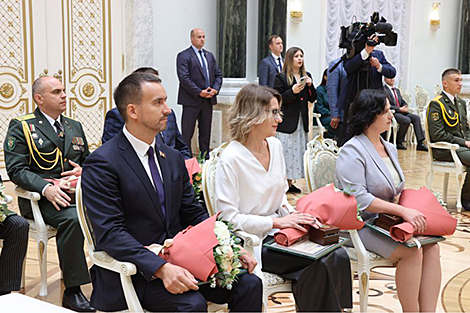
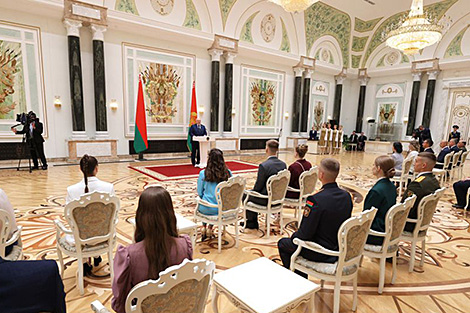
“Therefore, appreciate what was done before you. Use it. Use it as a foundation to build not only your personal life, but also to build a better future for the state as a whole. Although the destiny of any state, the life of any state is the life of every one of you personally,” president stressed.
The head of state expressed gratitude to the teaching staff: “You have studied a lot, worked hard and continue to improve your competencies. Because in your profession you need to keep up with the times and lead the way for your students. There is no other way.”
Aleksandr Lukashenko highlighted the importance of the fact that the award ceremony was held in the run-up to the main state holiday - Independence Day and the 80th anniversary of Belarus’ liberation of from Nazi invaders. The ceremony was also a tribute to the memory of the generation of winners. “Every success is a token of gratitude to the heroes who fought and died for a peaceful future. We have built it and we must preserve this future. We definitely will preserve it,” the president was convinced.
SUCCESSFUL PROJECT. What should become the motive force of Belarus’ and Russia’s economies?
Last week Vitebsk Oblast became a center of Belarusian-Russian regional cooperation. The region hosted the 11th Forum of Regions of Belarus and Russia. Belarus President Aleksandr Lukashenko and President of Russia Vladimir Putin sent greetings to participants of the forum.
In his video address the Belarusian head of state stressed that despite external pressure Belarus and Russia confidently move forward, developing the Union State integration and strengthening humanitarian ties.
He described the Forum of Regions of Belarus and Russia as one of the most successful and efficient projects of the Union State as well as a unique dialogue platform. A total of 588 agreements and over RUB450 billion worth of commercial contracts have been signed thanks to this forum. Serious accomplishments have been secured in aligning macroeconomic, industrial, agrarian, scientific, technological, and educational policies.
According to Aleksandr Lukashenko, matters concerning the establishment of an innovative economy of the Union State of Belarus and Russia are being logically put on the agenda of the Forum of Regions of Belarus and Russia because in the modern world it is impossible to ensure technological sovereignty and national security without developing and introducing innovative solutions.
“A lot has been accomplished. But we cannot rest on our accomplishments. We should strive to make innovations the key motive force of the economies of Belarus and Russia. Proactivity, creativity, unconventional thinking should set trends in the economic development of our countries,” the president said.
Aleksandr Lukashenko pointed out that it is impossible to develop an innovative economy in Belarus and Russia without an active stance of the regions: “The establishment of high-tech enterprises at the local level can become the most promising and sustainable points of economic growth.”
“We should not forget that ultimately all our efforts should be geared towards making people’s lives better,” the Belarusian leader underlined.
The president also mentioned an upcoming important date – the 80th anniversary of Belarus’ liberation from Nazi invaders. “One of the main lessons that we have learned from that terrible war is that fraternal peoples must always be together, stand shoulder to shoulder as they tackle emerging challenges, defend statehood, their traditions, and values. Only together can we ensure the security and well-being of our people,” the head of state was convinced.







 print version
print version make home page
make home page add to bookmarks
add to bookmarks

